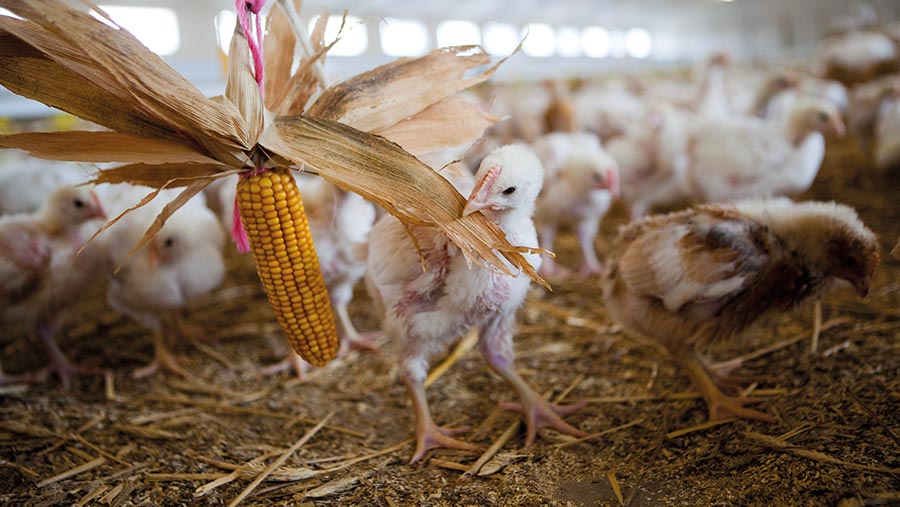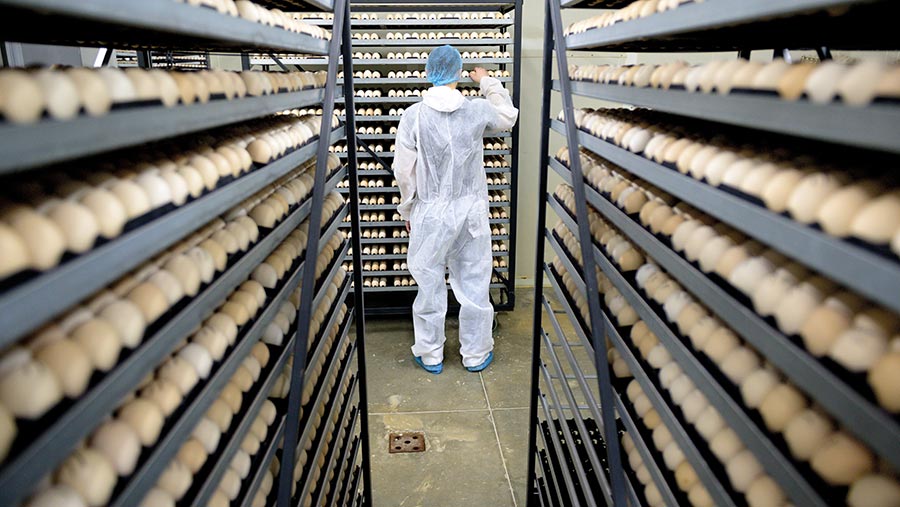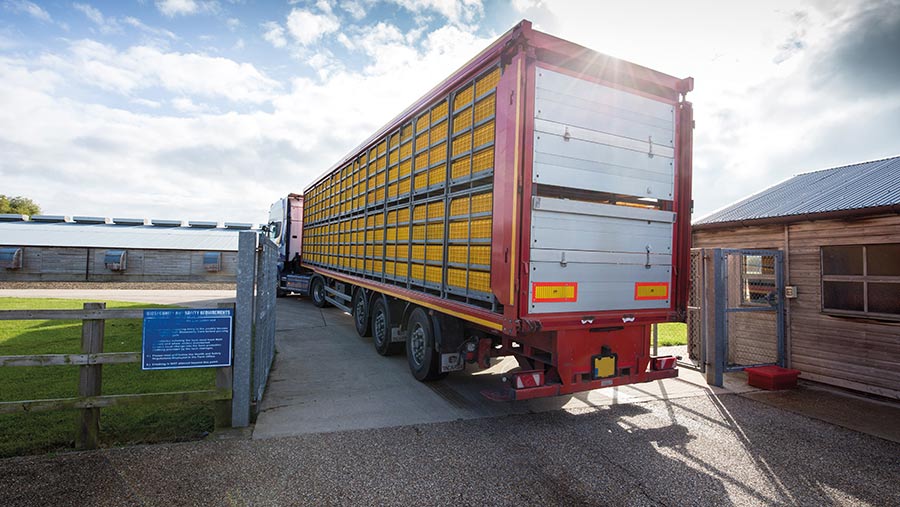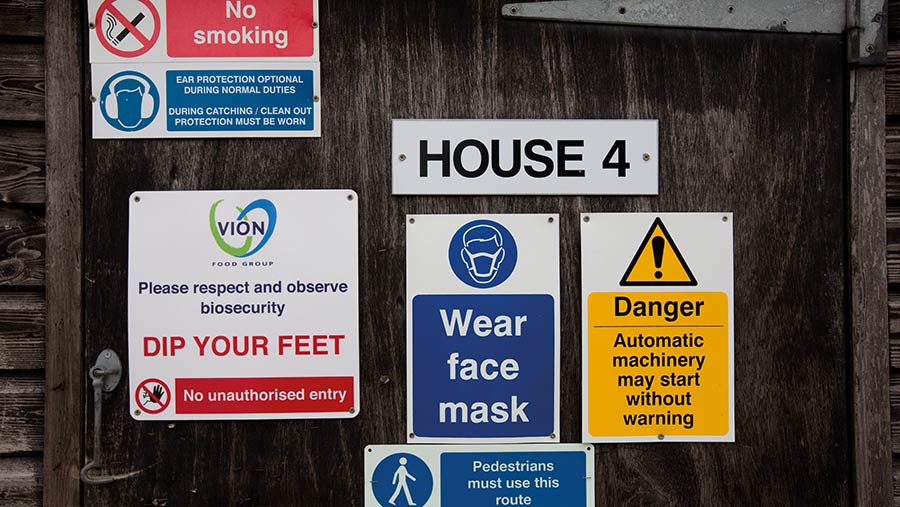How the new poultry standards proposals will affect farmers
 © RPSCA Assured
© RPSCA Assured Earlier this year, two consultations on farm assurance standards for the UK poultry sector came to a close.
Red Tractor and Defra propose changes that will help keep standards up to date while also meeting the expectations of consumers.
Red Tractor says its recommendations are primarily about streamlining, legislative compliance and responding to change.
See also: Outlook 2021: Poultry market risks and opportunities
Meanwhile, regulations around the transportation of live birds is the focus of the Defra amendments.
We look at what updates are being considered and what practical implications they would have for farmers.
What are the consultations and the next steps now?
The Red Tractor standards consultation closed on 5 March 2021.
It will now go back to the Technical Advisory Committees, made up of farmers, representatives and experts from the food supply chain, to reach a consensus on outcomes.
The final proposition will be published this summer, ahead of implementation in November 2021.
The Defra consultation on Improvements to Animal Welfare in Transport closed on 25 February 2021.
Defra will publish the collated responses before taking a decision on the way forward.
Animal welfare
Proposals
- For all poultry species, producers must measure and record the light intensity at bird eye level for each crop.
- For ducks, lighting will be phased on and off for a 30min dawn-dusk period and there is a new recommendation to have windows in all buildings that house ducks.
- A vet who has direct responsibility for the farm should prepare and review the flock health and welfare plan, rather than the producer.
- Only slow-growing breeds to be used for free-range chicken production, to ensure the breeds are suitable for the method of production. Where these breeds are used, perches can be higher – up to 50cm – to accommodate their activity.
- If enrichment is provided, it must be from the first day of chick placement and home-grown straw can be used across all enterprises – not just free-range. Perches must be available until depopulation for all broilers.
- A named officer, responsible for co-ordinating welfare on the farm or hatchery, is required.
- Breeder layers to test and record Mycoplasma gallisepticum and synoviae in line with Poultry Health Scheme requirements.
Response from the British Veterinary Poultry Association (BVPA)
Broiler growth is a function of nutrition and genetics. The marketplace looks for free-range birds at 2.3-2.8kg liveweight.
Free-range birds cannot be processed before 56 days, therefore, there is no incentive for the industry to use birds that grow too fast.
In the wake of Brexit, it is essential that the breeds used are not too restrictive as demand for free-range birds can rise faster than the breed companies can produce progeny from slow-growing breeds.
Enrichment objects can cause chicks to huddle around them during the first few days of life, impeding chick feed and water intake.
This will compromise chick health and welfare. We would propose that enrichment is not mandatory until day three.
Hatcheries

© Adobe Stock
Proposals
- All incubators must be checked twice daily, disposal equipment should be checked and recorded daily, and eggs are to be fumigated/sanitised prior to setting.
- In addition, injured and sick chicks should not be transported, the time between hatch and unloading should not exceed 48 hours, and chicks should be placed in clean, dry, ventilated boxes.
- Specific filter cleaning, further details on the ID of hatching eggs and a provision that eggs from Mycoplasma gallisepticum-positive flocks are not set.
- Transport records must include driver ID, destination and egg quantity, and vehicles must also have a cooling system and be left locked if unattended.
Biosecurity
- The biosecurity standards are under review, with the aim to simplify them and help with consistency and ease when auditing.
- Audits will cover specific areas such as site access for people and vehicles, hand cleanliness, footwear/foot-dipping and barriers, and clarifying biosecurity requirements for free-range broods.
- There should be a limit on bird movements between buildings and a specified minimum turnaround time.
Animal medicines
Proposals
- Not using medicines that have been opened and not used within the specified timescale and/or have expired.
- Medicines are not stored in the same fridge as food and drink.
- Fridge temperatures are checked and recorded weekly.
- Expired and unusable medicines are stored separately from in-use medicines.
- A revision to language of existing standards to make it explicit that prophylactic administration of antibiotics is not permitted, and using macrolides and fluroquinolones are a last resort.
Response from the BVPA
We strongly support this standard (prophylactic administration of antibiotics is not permitted).
However, it is important to emphasise that there should be an allowance for metaphylaxis to safeguard the health and welfare of birds.
For example, if there is a parent flock health issue that is affecting the chicks, not treating the chicks in this situation would compromise their welfare.
BVPA members have concerns about the impact on small companies of having to destroy a Mycoplasma gallisepticum parent flock.
Many affected flocks can go on to have healthy progeny when correctly managed.
Mycoplasma strains vary in pathogenicity and some Mycoplasma synoviae strains can be more pathogenic than Mycoplasma gallisepticum.
If mycoplasma-free parent flocks are to be achieved then ideally the industry would work to ascertain the prevalence of Mycoplasma gallisepticum and Mycoplasma synoviae in the industry, then work with veterinary colleagues to create an eradication programme.
Animal welfare in transport consultation

© Tim Scrivener
Defra’s proposals include maximum journey times, banning live animal exports, introducing temperature conditions, minimum headroom and restrictions on sea transport.
“Bird welfare in the UK is world-class, science-based, and continually improving,” says Richard Griffiths, chief executive at the British Poultry Council.
“The health and wellbeing of our birds is of the highest priority and in everyone’s interest.
“We are disappointed that the government consultation suggests implementing significant changes to the requirements for the transport of birds without investing in the necessary scientific research and evidence base to support such changes,” he adds.
“It is crucial that further research is conducted to assess welfare in transport using modern broiler genotypes and transport systems.
“Making legislative changes without the latest research would be both premature and potentially damaging to the strides made in bird welfare during transport over the past 25 years.”
Proposal
- Maximum journey time of four hours for broiler chickens and 21 hours for recently hatched chicks.
Response from the British Poultry Council (BPC)
Limiting broilers’ journey time to slaughter to a maximum of four hours will result in a 50% reduction in the total number of broiler journeys in the UK.
This will have a catastrophic impact on UK food security and the local economy.
Limiting the transport of day-old chicks to 21 hours would prevent more than 70% of UK breeding stock exports and force primary breeding companies to move their breeding programmes to other countries.
Proposal
- No poultry journeys will be allowed to take place if the forecast external temperature is outside a range of 5-25C.
Response from the BPC
Prohibiting both short and long poultry journeys when the external temperature is outside the range of 5-25C would result in the cancellation of most journeys in January and February as well as a significant percentage in November, December, March, and April.
Implementing this requirement would mean a complete change to the poultry transport fleet, resulting in an additional cost of £55m without any evidence-based guarantee of better welfare for the birds.
Proposal
- No live animal journeys will be able to take place by sea during Beaufort Wind Force of six or above.
Response from the BPC
Preventing the passage of day-old chicks on ferries at the last minute where wind speed is more than 37kph would increase the likelihood of destruction of valuable day-olds.

